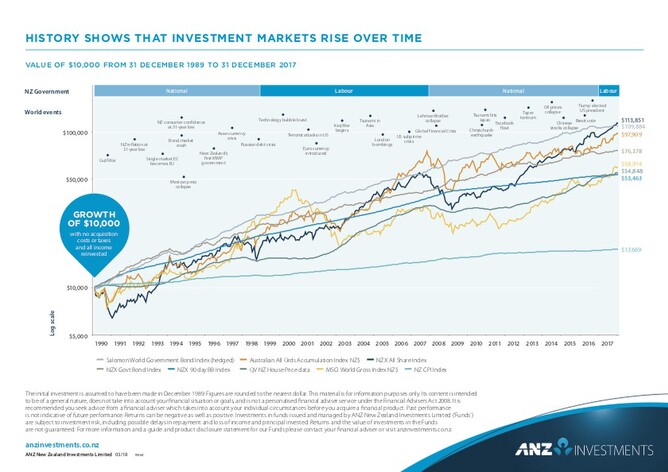Bad news is a great opportunity for the media to write articles with words like 'plummeting, crisis, disaster, huge losses, plunging' in the headlines. It can be hard to hold your nerve at times like this, and remember, your newsfeeds online from Google, or Facebook only reinforce what you have already been reading.
Apart from getting you to and through retirement, helping you to overcome your natural instinct to panic when you read such stories is a core part of our role as your financial adviser.
It is natural to want to 'get out' at such times from your investments, and over the last 22 years, we have helped many of our clients overcome those natural human instincts and stay invested.
As you know, your investment portfolio and KiwiSaver will go up and down in value with changes in market valuations. In the last quarter of 2018 we saw major falls in the value of investment markets and investments, and we thought that this was the long anticipated 'correction' of markets. We were wrong, the markets rebounded rapidly, and many of our clients have investment returns of between 6.00% and over 15.00% depending on their risk profile for the last 12 months.
One of the important things to get your head around is the difference between temporary loss (like in the last quarter of 2018 and during 2009 -2010) and permanent loss.
The investments that Moneyworks recommends to our clients (through OneAnswer and KiwiSaver) are generally invested through well diversified investment portfolios that are professionally managed.
Temporary capital loss
This occurs when the value of your investments go down in value. As long as you don't need those funds in the near future, this shouldn't make any difference to your planning and investing behaviour.
This is why we often recommend that as you get closer to retirement, you ensure that you have your first 2-3 years spending money set aside in cash or term deposits, so that if your portfolio does have a temporary downturn in investment value, it has time to recover before you need to use the funds for your retirement spending. Each year you should then top up the day to day spending money in your account.
From time to time these managers will increase the cash in their portfolios if they feel that the outlook for markets is not healthy (at least three of your fund managers did this at the start of 2016 - and when markets kept on going up - their relative performance suffered). This may lead to underperformance for a period, but may - on the other hand lead to less temporary losses in your portfolio.
Permanent capital loss
Permanent loss of capital happens when you are invested in an investment that just vanishes, or where there is fraud (as with Bridgecorp and a number of the other finance companies).
Permanent loss of capital can also occur when the company that you are invested in 'gets it wrong' (eg Kodak not for-seeing the future of digital camera's), or where the valuations of the investment on the sharemarket are not based on real cash flow and profit (eg Uber, WeWork at present). Another example is if the company is taking too many risks, has too much debt. That is what your fund managers spend a lot of their time researching and evaluating.
Within some of the investments that Moneyworks has recommended to our clients, some of the fund managers have made bad decisions.
For example, Harbour made an error and invested in CBL insurance. This was a situation that led to a permanent loss of capital in that investment, However, because your portfolio is well diversified, and the Harbour investment is very well diversified, that permanent loss of capital ended up being a two decimal (or even three decimal - as in 0.005%) impact on your portfolio.
Another way to have a permanent loss of capital is if you have used 'leverage' on your portfolio. This means borrowing money to invest. This is not very common in New Zealand, but more common overseas. It is not something that Moneyworks recommends to our clients. This could lead to you having to front up with money to repay the loan that you have taken out if you have a temporary loss on your portfolio.
If you have any questions about this topic, please don't hesitate to email your adviser, or ask them when you next meet with them.


